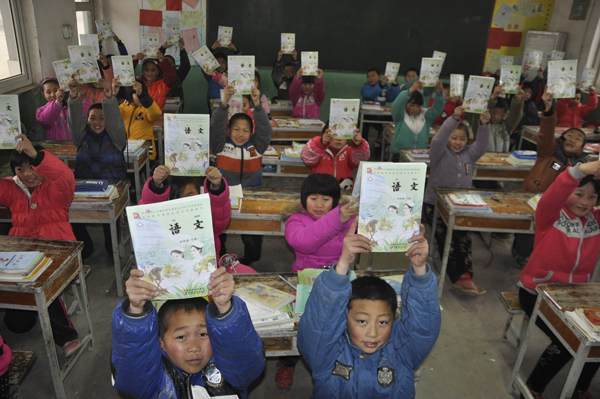System to reduce dropouts, school closures
Updated: 2013-02-27 02:35
By Jin Zhu (China Daily)
|
||||||||
|
 Fourth-graders show off their free new textbooks at a primary school in Liaocheng, Shandong province, on Monday, the first day of the new semester. [ZHAO YUGUO / FOR CHINA DAILY] |
A planned nationwide education accountability system aims to reduce the number of students who drop out because of closures and rural-school mergers, the Ministry of Education said on Tuesday.
Du Kewei, a ministry official in charge of basic education, said local governments have been asked to work out plans for their rural elementary and junior high schools for the next three years.
The plans must be submitted to central education authorities by the end of June. No closures or mergers will be allowed until the new local plans come out, Du said at a news conference on Tuesday.
"The ministry will interview local education authorities and urge improvement if more students drop out in rural areas because of closures or school mergers," he said.
China had encouraged closures and mergers of rural schools since 2002 to address the continued decline of the school-age population in rural areas caused by the country's rapid urbanization.
"But the country will not weaken its education resources in rural areas in the future. Instead, rural education will be strengthened to ensure every child in such areas receives a good education," Du said.
The number of rural primary schools in China dropped 52 percent from 2000 to 2010, according to a report from the Beijing-based 21st Century Education Research Institute in November.
Many rural students entered schools in towns or cities, or simply dropped out.
Officials and analysts said China's nine-year compulsory education already covers nearly all students. The future task is to achieve balanced development among different regions, especially between urban and rural areas.
The number of school-age children for compulsory education in rural areas who have been left behind by their migrant-worker parents stands at 22 million, the ministry said.
A six-year renovation project for schools in rural areas was launched by the Ministry of Education and the Ministry of Finance in 2010, covering 23 central and western provinces as well as Fujian, Shandong, and Liaoning provinces.
The project aims to improve learning conditions among those schools by purchasing books and teaching experimental apparatus, as well as by adding accommodations.
The central government so far has spent 61.8 billion yuan ($9.92 billion) on the project, the ministry said.
In addition, more than 61,000 university graduates have been recruited as teachers in rural schools in western regions last year, an increase of nearly 12,000 compared with 2011, it said.
"How to attract more young and educated people to teaching in less-developed central and western provinces is an important task that authorities need to consider," said Xu Tao, a ministry official in charge of teachers' work.
"Special subsidies for teachers in those regions, such as on their transportation and communication expenses, will increase," he said.
Zhu Xiaoman, a professor of education at Beijing Normal University, called for more recruiting focused on teachers who specialize in music, sports, and English, which now are in short supply in rural schools.
Contact the writer at jinzhu@chinadaily.com.cn
 Li Na on Time cover, makes influential 100 list
Li Na on Time cover, makes influential 100 list
 FBI releases photos of 2 Boston bombings suspects
FBI releases photos of 2 Boston bombings suspects
 World's wackiest hairstyles
World's wackiest hairstyles
 Sandstorms strike Northwest China
Sandstorms strike Northwest China
 Never-seen photos of Madonna on display
Never-seen photos of Madonna on display
 H7N9 outbreak linked to waterfowl migration
H7N9 outbreak linked to waterfowl migration
 Dozens feared dead in Texas plant blast
Dozens feared dead in Texas plant blast
 Venezuelan court rules out manual votes counting
Venezuelan court rules out manual votes counting
Most Viewed
Editor's Picks

|

|

|

|

|

|
Today's Top News
Boston bombing suspect reported cornered on boat
7.0-magnitude quake hits Sichuan
Cross-talk artist helps to spread the word
'Green' awareness levels drop in Beijing
Palace Museum spruces up
First couple on Time's list of most influential
H7N9 flu transmission studied
Trading channels 'need to broaden'
US Weekly

|

|








